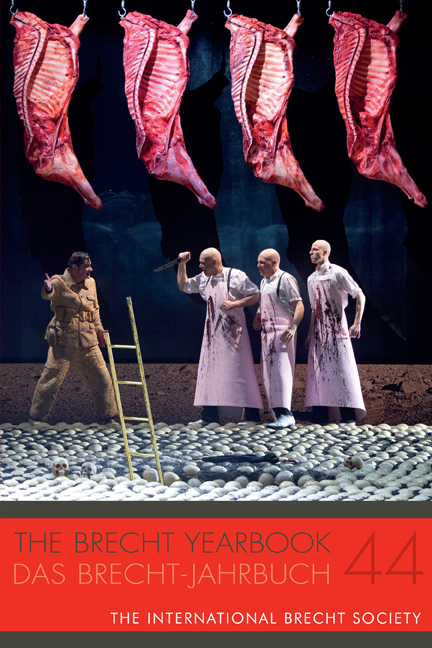Book contents
- Frontmatter
- Officers of the International Brecht Society
- Contents
- Editorial
- List of Abbreviations
- Brecht, Günter Kunert, and Edgar Lee Masters
- Brecht’s Dramatic Fragments
- Pure Joke: The Comedy of Theater since Brecht
- New Brecht Research
- Book Reviews
- Notes on the Contributors
- Now at De Gruyter Exilforschung Ein Internationales Jahrbuch
Matt Cornish. Performing Unification: History and Nation in German Theater after 1989
Published online by Cambridge University Press: 09 February 2021
- Frontmatter
- Officers of the International Brecht Society
- Contents
- Editorial
- List of Abbreviations
- Brecht, Günter Kunert, and Edgar Lee Masters
- Brecht’s Dramatic Fragments
- Pure Joke: The Comedy of Theater since Brecht
- New Brecht Research
- Book Reviews
- Notes on the Contributors
- Now at De Gruyter Exilforschung Ein Internationales Jahrbuch
Summary
Matt Cornish's recent book Performing Unification (2017) is an important contribution to German theater history. Following the introduction and a chapter on the role of theater in the consolidation of the nation state in the eighteenth and nineteenth centuries, Cornish investigates the theatrical representation of German unification in 1990. He arrives at his main discoveries through the analysis of the narrative forms of history—historiography—in relation to narrative forms in theater—dramaturgy. Cornish develops Hayden White's analysis of historiographic approaches as narrative emplotments— that is, how the historian organizes events into story using archetypical narrative forms. Through the analysis of performances of unification, Cornish expands the scope of analysis to contemporary theater dramaturgies, and to theater's function as historical account.
Central to his investigation is the idea that articulating a past event as history is a form of “collectively imagining a future” (6). This idea puts him in direct conversation with the literature on theater and history, particularly with scholarship that explores theater's participation in imagining political projects through the staging of history. Indirectly, this concern for collective imagination also links the book with works on theater and the public sphere. His overall focus, though, remains “internal” to theater. Cornish is not interested in the role of theater within a wider public dialog. He develops a theory of theater's participation in the emplotment of history and of theater's recourse to historiography, not of its function as an institution and interface with the public. He discusses how dramaturgies translate ideas of history and change or perpetuate historiography's political function. More specifically, he examines theater that challenges state historiography. His decision to discuss “unification” rather than “re-unification” is already a “hint” to his political motivation. The book is an attempt to organize and explicate how theater challenges a deterministic (and celebratory) account of unification.
Cornish moves deftly between theoretical discussion, drama, and performance analysis. This back and forth is a flexible and productive scaffolding. It allows him to both discuss plays that are explicitly about unification and plays that are less explicitly so, excavating the ways in which their “historiographic intervention” resists the determinism of post-unification state historiography.
- Type
- Chapter
- Information
- The Brecht Yearbook / Das Brecht-Jahrbuch 44 , pp. 261 - 264Publisher: Boydell & BrewerPrint publication year: 2019

